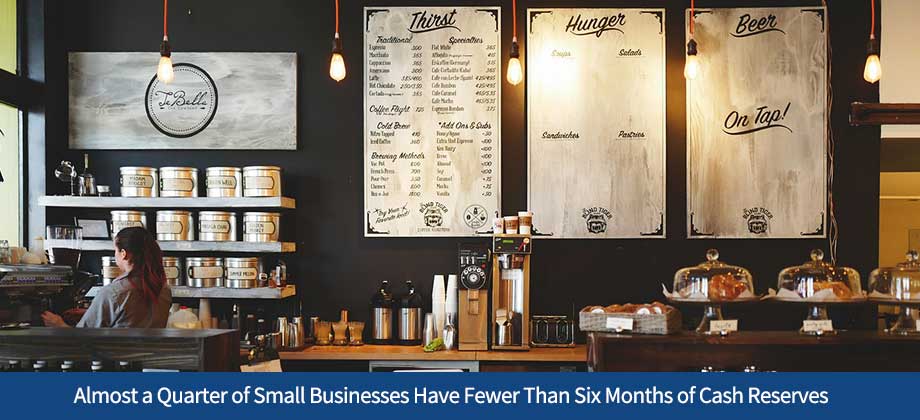New Survey Shows Almost a Quarter of Small Businesses Have Fewer Than Six Months of Cash Reserves

Recent findings from a Stenn survey highlight a startling fact—almost a quarter of small businesses have less than six months of cash reserves. This reality places many small to medium-sized businesses (SMBs) at risk of financial instability. For small business owners, understanding and addressing this issue is critical to ensuring survival and fostering growth.
As we explore the importance of cash reserves and the impact they have on your business’s future, you’ll discover practical strategies to strengthen your financial foundation and prepare for unexpected challenges.
The Alarming State of Cash Reserves
A Vulnerable Position
According to Stenn’s survey, 21.6% of SMBs have only 1-5 months of cash reserves. This figure is concerning, given that businesses are often susceptible to external shocks like economic downturns or unexpected expenses. Without adequate reserves, small businesses could quickly find themselves in perilous financial situations, unable to meet obligations or capitalize on growth opportunities.
Economic Contributors at Risk
Small businesses are vital contributors to the economy. With 33.2 million small businesses in the U.S. employing 61.6 million people, they account for 45.9% of all domestic employees as of 2023. Their success is crucial not only for their owners and employees but also for the wider economy. Yet, with over 20% failing within their first year and more than 45% within five years, the need for robust cash reserves is evident.
Balancing Growth and Stability
The survey also found that 45% of small businesses are nearing a growth inflection point, with plans to scale operations in the next 6-18 months. However, balancing short-term financial needs with long-term growth objectives remains a challenge. Cash reserves are crucial for enabling strategic investments in marketing, inventory, and new offerings.
Why Cash Reserves Are Essential
Ensuring Continuity and Resilience
Cash reserves act as a financial cushion, allowing businesses to weather unexpected storms. Whether it’s a dip in revenue, an unforeseen repair, or a global crisis, having funds set aside provides the necessary breathing room to continue operations without resorting to desperate measures.
Capitalizing on Opportunities
Opportunities often arise unexpectedly. Whether it’s purchasing discounted inventory, investing in new technology, or expanding into a new market, having cash on hand enables businesses to act swiftly and strategically. Without sufficient reserves, these opportunities may be missed or necessitate taking on debt.
Building Financial Security
Financial security is about more than just surviving; it’s about thriving. A healthy reserve allows business owners to make informed decisions, avoid merchant cash advances, and maintain peace of mind. It fosters an environment where calculated risks are possible, paving the way for sustainable growth.
Strategies for Building Cash Reserves
Assess Current Financial Health
Start by evaluating your current financial position. Analyze cash flow statements, assess liabilities, and identify potential cost-saving areas. Understanding where you stand will help set realistic goals for building reserves.
Implement Budgeting Practices
Effective budgeting is the foundation of financial stability. Create a detailed budget that accounts for all expenses, including fixed, variable, and unexpected costs. Allocate a portion of profits to your reserve fund regularly, treating it as a non-negotiable expense.
Optimize Cash Flow Management
Improving cash flow involves strategies like invoicing promptly, managing inventory efficiently, and negotiating better payment terms with suppliers. Implementing these tactics will help free up cash to bolster your reserves.
Leveraging Financial Tools and Resources
Explore Financing Options
While building reserves is ideal, sometimes external financing is necessary. Consider options like lines of credit, business loans, or grants. Ensure you understand the terms and choose solutions that align with your business goals.
Utilize Technology for Financial Insights
Modern financial management software offers valuable insights into cash flow patterns and trends. Tools like QuickBooks or Xero provide real-time data, helping you make informed decisions that support reserve building.
Seek Professional Advice
A financial advisor or accountant can offer expert guidance tailored to your business’s unique circumstances. They can help identify opportunities for savings, optimize tax strategies, and develop a long-term financial plan.
Cultivating a Resilient Business Mindset
Foster a Culture of Efficiency
Encourage a culture of efficiency within your organization. Optimize processes, reduce waste, and focus on maximizing productivity. These efforts contribute to healthier cash flow and stronger reserves.
Prioritize Customer Relationships
Loyal customers are invaluable assets. Building strong relationships leads to repeat business, referrals, and steady revenue streams—all essential for maintaining robust cash reserves.
Adaptability as a Core Value
The business landscape is constantly evolving. Cultivate adaptability as a core value, enabling your business to pivot and respond to changes effectively. This proactive approach minimizes disruptions and enhances financial resilience.
The Role of Cash Reserves in Growth
Supporting Innovation and Expansion
Cash reserves provide the flexibility needed to invest in innovation and expansion. Whether it’s launching a new product line or entering a new market, having funds available ensures your business can seize opportunities and stay ahead of competitors.
Enhancing Creditworthiness
A strong financial position, supported by healthy cash reserves, enhances your creditworthiness. Lenders and investors view well-managed finances favorably, increasing your chances of securing favorable funding when needed.
Building Long-Term Sustainability
Ultimately, cash reserves are about building a sustainable future. They empower businesses to weather challenges, capitalize on opportunities, and achieve long-term success in a competitive market.
Conclusion
For small business owners, cash reserves are not just a safety net—they’re a strategic asset. By prioritizing cash reserve building, businesses can fortify their financial foundation, ensuring continuity, resilience, and growth.
In an era where uncertainty is the norm, small business owners must take proactive steps to safeguard their financial future. By implementing practical strategies, leveraging available lines of credit, and fostering a resilient mindset, your business can thrive and contribute positively to the broader economy.
Your privacy is important to us. ARF Financial will never sell or rent your information to any third party. Click here for more information about our privacy policy. Image by StockSnap from Pixabay

